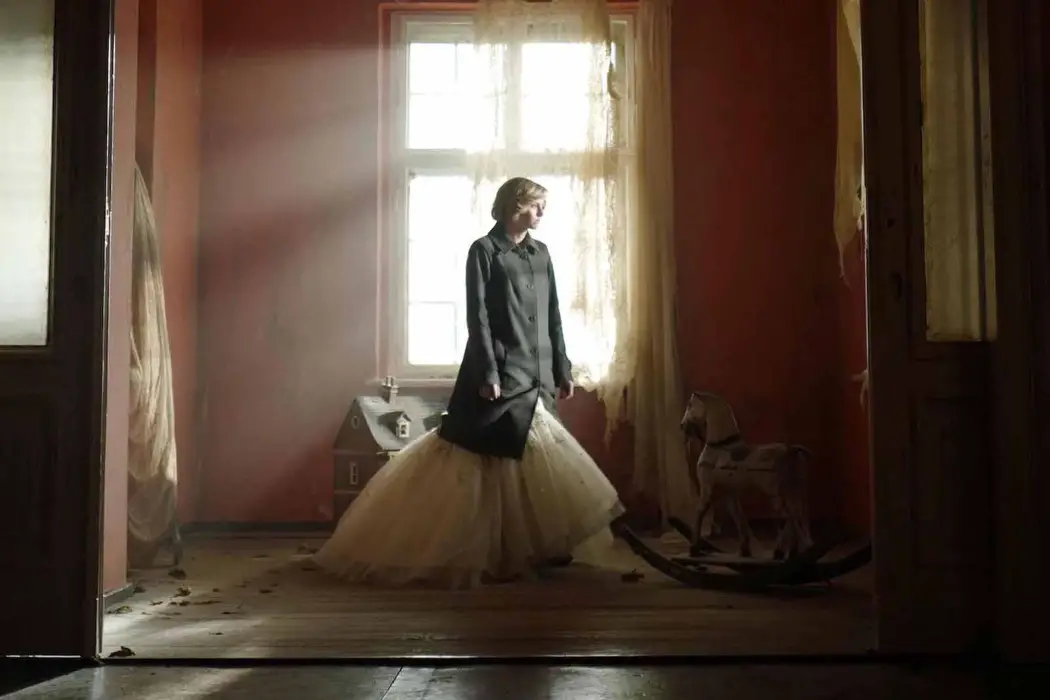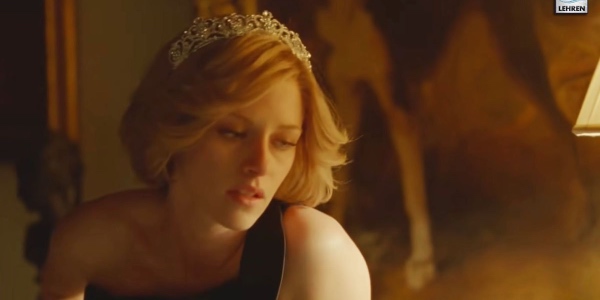SPENCER: A Prolific Examination of Mental Health

Stephanie Archer is 39 year old film fanatic living in…
Diana, Princess of Whales, has been the fascination of the public since her name was first attached to the future King of England. While her popularity derived from her engagement, her story, personality and tragedy made her a name history will remember. In the last year, interest in Diana’s story has been reinvigorated, Netflix’s acclaimed The Crown recently delving into her story for season 4, and a broadway production encompassing her life made accessible through both stage and streaming. Coupled by the stark comparison between her story and the departure of Prince Harry and Megan Markle from the Royal family, the currency of Diana, Princess of Whales, proves to still have value.
And while their takes have encompassed the story as a while, Pablo Larraín’s Spencer zeros in on a moment, where the tradition of undefined time and expectation create a horror story built in reality. As the film opens, a title card states “A fable from a true tragedy”, setting the expectations for viewers. It is fictitious, yet grounded in reality, a prolific examination of mental health through isolation and suffocation of tradition and restraint. Debatably a horror film of our time, its terror is reflected in the lingering truth and conspiracy that caresses each element of its story. Deeply moving, Spencer is breathtaking in every sense a film can be. From Jonny Greenwood‘s score to Claire Mathon‘s cinematography, Steven Knight‘s script to Kristen Stewart‘s performance, each moment of Spencer pulls the curtains back on the mental health and the isolation of a nation’s princess – all while embracing the deeply rooted nature of motherhood.
A Wild Spirit in the Face of Tradition
Spencer opens to the rigidity of royal life and tradition. The family can not arrive until the place has been swept for any security threats, the parallel march of the soldiers leaving mirroring the same motions of the cooks arriving to prepare the first meal of the day. There is a strict code of conduct, one that is met by all. As Major Alistar Gregory (Timothy Spall) and the staff upstairs are waiting for the arrival of the Royal family, Prince Charles (Jack Farthing), with his sons Prince William (Jack Nielen) and Prince Harry (Freddie Spry), arrive early – the staff insinuating what this means for the fragile relationship of the Prince and Princess of Whales. While he is noted as arriving early, she is noted for arriving late.

As the remaining family arrives before the Queen (Stella Gonet), Diana (Kristen Stewart) is shown lost in the former town she once grew up in – the first indication Spencer gives its audience of her loss of self. As Diana refuses to move forward, she finds herself moving back, identifying a scarecrow she once dressed up as a child. From this moment, Spencer focuses heavily not only on the wild spirit vs. tradition but on the inability to move forward when there is no clear indication of the past or the present. For Diana, she longs for the freedom of her childhood, all while she is met with the present rulings of those around her.
As Diana finally arrives at Sandringham, the Queen’s estate in Norfolk, she is immediately met with the conspiracies of her mind, both fueled by herself and those around her. “Don’t look at everything as a conspiracy” her Royal dresser Maggie (Sally Hawkins) advises. There is already a hesitancy to Diana as she enters the estate, the room almost swallowing her whole. The set design exhibited here is exquisite, speaking to the hollow nature of the “The Firm” through its emptiness and adherence to immediate tradition. As you enter the doors of reality, so too here are expectations laid at your feet as you cross the threshold. As you take in the vastness of the room, you swear you can almost hear the voices of Gregory and Diana threatening to echo down the halls to no one.
Suffocating Isolation and Loneliness
Throughout the course of Christmas weekend, from Christmas Eve to Boxing Day, Spencer captures the wavering stability of the Princess, the manipulations of self and those around her feeding her suspicions and paranoia. Where Spencer truly excels, breaking from the traditions of other depictions, is in the inclusion of the Royal family – or lack thereof. Here, Diana is depicted primarily separated from the rest of the family, the film playing as its own form of isolation. Little interactions are warranted, either Diana excusing herself from the festivities or others refusing to interact with her. Even as the family is arriving at the beginning of the film, they are only shown from behind, their backs almost turned on the ill-fated Princess who still has yet to arrive. From the very beginning, “The Firm” is depicted as closing ranks.

This isolation from the family resonates loudly in the power and potentially devastating effects of silence. While Diana is shown frequently interacting with her sons, a deeply invested look at her role as a mother, she has little interaction with the family – even when they are shown. Rather, many of Diana’s interactions are limited to her communications with the estate’s staff. While Maggie provides a personified life support for Diana, others work to feed her paranoia. While she is shown making an attempt to relate to them, clinging to some semblance of normalcy outside of royal life, their dedication to the crown and to the currency of knowledge she represents retains the horror of betrayal and suspicion at every turn. While they give her the respect she is afforded, their true selves are never shown or spoken – too often henchmen of “The Firm” and the almighty dollar.
The Best Films Hit All the Marks
While conspiracy and watchmen reside in the shadows, it is made apparent that no one is above tradition. There is a feeling of worthlessness that filters through Spencer, suffocating any sense of self or spirit that still resides in Diana. She is no longer a person, but rather a symbol of a country and the monarchy. You can literally feel the walls closing in on her – both institutionally and self-imposed. This success in character is thanks to the career performance of Kristen Stewart. She is immersive in her depiction, losing her own identity in the tragedy of her subject. Her performance is mesmerizing, hypnotic, and tragic, giving the artistic rendition of mental health the raw vulnerability necessary to bring this Diana to life. There is a wild spirit fighting the taming of tradition, and Stewart balances the battle with poise and grace. There is a commitment to every aspect of her take on Diana, one that leaves others in its wake. Her performance is sure to resonate throughout the remaining Oscar season – and beyond.

But it is not only Stewart that drives this home run. The movie has the same resonating feeling as Larraín’s Jackie with close-up shots on its subject, but also wide enough at times to give the character space to move within the frame. The camera does not create isolation, rather the set design and framing. Like Jackie, Spencer does feel as though it is just a bit behind, its pace almost feeling as though it needs a nudge to keep moving along. Yet, the pace in Jackie dragged the film, here it works to encapsulate the feeling of being left behind, of trudging through the mud alone, slowly sinking under the weight of tradition and devaluation.
Immediately, for Stewart is even first seen on screen, it is the film’s score that will capture your attention, pulsating around and within the viewer. There is a play in musical tone, a quiet and eerily driven Jane Austin adaptation feel, the notes old that transform and are ominously held. Many times, in these moments, Hans Zimmer‘s score for Christopher Nolan‘s Batman films, specifically The Dark Knight, comes to mind. The crescendoing, self-contained notes heighten the tension, further compounded by the slow increase of volume speaking to the escalating claustrophobia closing in around Diana. One scene in particular, early on in the film, boasts both close-ups and wide shots of the dining room accompanied by this growing score speaking to the suffocation one can feel in such a vast space, and the loneliness felt when in a crowd.

Contrasting this score is the other half, the wildly free-spirited jazz sounds swarming around its characters, either through defiance or insanity, as the notes fly freely from the constraint of classical renderings. It captures the wild horse that can not be broken. This score accompanies Diana as well, speaking to the internal battle constantly brewing within her. It speaks to an emotional state – both for its highs and its lows.
Conclusion: Spencer
At the end of the day, Pablo Larraín’s Spencer may feel like a real-life horror film, but its central focus on family, motherhood, and mental health ground it in reality. There is a deep sadness that swells around each celluloid frame, the failure of an institution, as well as quietly placed accusations, filling the unspoken spaces. While previous depictions have tried to capture the story, Spencer attempts to capture a moment, whether in time, space or emotion, through the tumultuous landscape of mental health and motherhood. It asks viewers to consider – where do you run when the past is the present and there is no future.
Spencer is one of the best, if not the best, films of the year, grounded by a career standout performance from Kristen Stewart. And while it is sure to have its fair share of awards analytics, it is a film that goes above the praise, opening a platform of discussion that goes beyond its central figure, making it a film with the ability to speak to many.
Have you seen Spencer? What did you think? Let us know in the comments below!
Spencer was released on November 5, 2021. For all international release dates, see here.
Watch Spencer
Does content like this matter to you?
Become a Member and support film journalism. Unlock access to all of Film Inquiry`s great articles. Join a community of like-minded readers who are passionate about cinema - get access to our private members Network, give back to independent filmmakers, and more.













